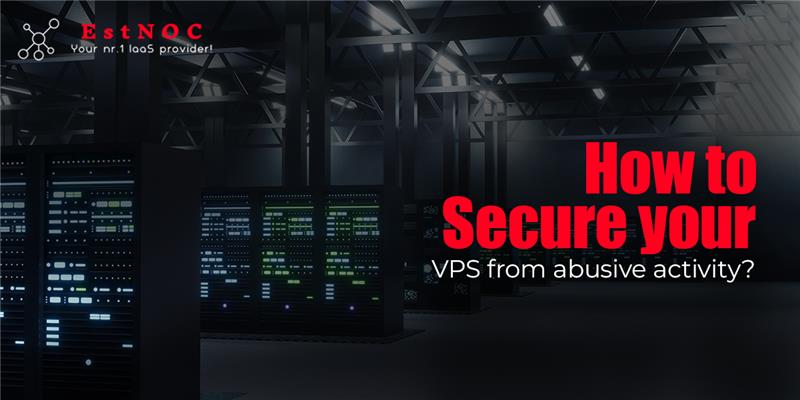10 Strategies for Optimizing....
In the ever-evolving..
By Admin / 13 February

Businesses heavily depend on Virtual Private Servers (VPS) for hosting applications and websites and managing data remotely. However, with the increasing sophistication of cyberattacks, simply hosting your platform on a VPS is not enough. Without proper security measures, your VPS server security may become a target for hackers, botnets, or malicious users. Hence, it's essential to know how to protect VPS environments from any form of abuse.
Additionally, whether you’re running a small blog, an e-commerce website, or enterprise-level applications, investing in VPS server security isn't just an option; it’s a necessity.
In this blog, we’ll walk you through why VPS servers are vulnerable and provide a complete guide to securing your server from abusive activity.
Before diving into protection techniques, it’s important to understand why VPS servers are often targeted. Since VPS offers dedicated resources at an affordable cost, thus, it's commonly used for hosting sensitive workloads. However, a misconfigured VPS can easily fall victim to:
In many cases, these attacks occur because users either forget or ignore basic VPS server security practices.
Meanwhile, ensuring a secure VPS server does more than just block hackers. It:
So, without proper action, your server might be blacklisted or penalized by hosting providers. Therefore, implementing layered vps server security is critical for long-term success.
One of the most basic yet effective ways to protect VPS environments is by keeping the system and applications up to date. So, many hackers frequently obtain access by taking advantage of out-of-date software.
Therefore, make it a habit to:
On the other hand, with updated systems, many known vulnerabilities are fixed before they can be exploited.
Many VPS providers include root access by default. While convenient, this can be very risky in certain situations. Essentially, if a brute-force attack successfully guesses your root password, it’s all over. Instead:
Therefore, this simple change greatly improves VPS server security.
Using SSH keys for authentication provides significantly stronger security compared to relying on passwords alone.
Additionally, although passwords can be guessed, SSH keys are nearly impossible to brute-force.
However, generate a public-private key pair on your local machine.
Then, using SSH keys guarantees that only authorized users can access your secure vps server.
To protect VPS setups, a properly configured firewall is essential. Ultimately, firewalls can block all unnecessary ports and permit only specific services.
Some essential practices include:
Therefore, for improved VPS server security, consider using Web Application Firewalls (WAF) as an extra layer.
An IDS helps monitor suspicious activity and blocks malicious IPs in real time.
For example:
Overall, it might not fully prevent a hacker, but it will greatly slow them down or deter additional attempts.
Although VPS can handle moderate traffic, a DDoS attack can easily bring it down.
Considering how to protect VPS servers:
Additionally, a layered defense guarantees a secure VPS server even during heavy load or attacks.
Even with strong security, breaches can still happen. Although backups are your safety net.
This way, even if your vps server security is compromised, your data isn’t lost.
In particular, monitoring tools such as these offer real-time insights into what’s happening on your VPS.
Additionally, log monitoring provides visibility, which is essential for keeping a secure VPS server.
Though SSH keys are ideal, passwords are still used for databases, control panels, and other software.
Therefore, weak passwords greatly jeopardize the security of VPS servers. Avoid using them at all costs.
Applications should operate with the least privileges needed. Also, avoid giving full control to a script or plugin unless it's essential.
Additionally, this limits the damage even if an application is exploited.
A secure VPS server requires ongoing maintenance. Therefore, it demands constant vigilance, regular updates, and proactive actions. Additionally, from configuring firewalls to monitoring logs, every layer of protection is crucial for safeguarding your digital assets. Typically, by following the steps outlined above, you can greatly improve your VPS server security and create a robust environment capable of resisting abuse, attacks, and unauthorized access. Since prevention is always better than cure, take the time to secure your virtual private server setup today.
At Estnoc, we focus on providing high-performance, secure, and reliable VPS hosting solutions for businesses of all sizes. As a globally recognized hosting provider, we prioritize your data security and uptime. Our infrastructure is protected with state-of-the-art firewalls, DDoS protection, and 24/7 monitoring, so you never have to worry about vulnerabilities. We offer customizable plans, expert support, and built-in security tools that keep your environment secure at all times. Whether you're a developer, agency, or enterprise, we make it simple to protect VPS servers from any kind of abuse. Contact us today to start with a secure VPS server designed for the future.